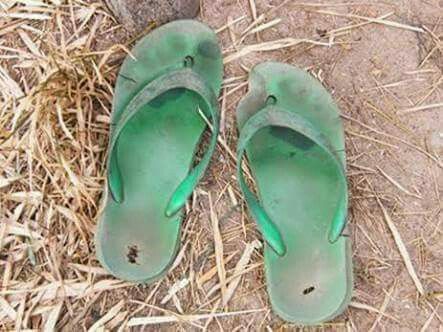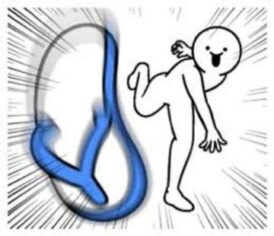The Legacy of The Flying Slipper
In every African home, there was one item feared more than ghosts, the devil, or the math teacher — the slipper.
Not just any slipper. No. This was The Chosen One. Usually a blue plastic Bata. Worn out. Bent at the heel. Slightly chewed at the edges (by time or fate). And yet, it had power.
The slipper was not just footwear. It was a weapon — fashioned against disobedient children, and unlike the Bible verse… it prospered. A disciplinary tool. A form of communication. A cultural artifact with the speed of a gazelle, the precision of a GPS-guided missile, and the authority of a Supreme Court judge.
African Parenting or Martial Arts?
Your crimes didn’t even have to be serious. You forgot to soak your school uniform? Slipper. You came home and didn’t greet everyone? Slipper. You looked at your mother some type of way? Slipper…and emotional damage.
And if you thought running would save you, you were deeply mistaken.
That slipper could curve mid-air, change direction, and find you around a corner, as if it had Bluetooth and facial recognition.
It didn’t matter if you ducked. The slipper would rise like the phoenix and strike again — twice if necessary.
There Were Levels to This Discipline
African parents didn’t always shout. Sometimes they were calm. Too calm.
“Go bring me that slipper.”
At that point, your soul would leave your body.
The walk to retrieve the slipper was the longest journey of your life. The slipper would be lying there, quietly. Innocent. But you knew what was coming. You handed it over like someone handing the judge the rope at their own trial.
And don’t even think about hiding it. Many tried. Many failed. But the slipper always found its way.
Some slippers were replaced by belts, wooden cooking spoons, or that famous “pata pata” rubber sandal that made musical slaps on skin.
We Laughed Later… When It Was Safe
Now, as adults, we sit in group chats and laugh. We compare our slipper survival stories like war veterans.
“Mine was green. It used to bend like paper and still slap sense into you.”
“My mama’s slipper had holes, but it could still destroy your ego.”
“I once outran the slipper. Only to find it waiting for me at the door.”
We joke now, but in truth, that slipper raised us. It taught us about boundaries, respect, and consequences. It was never about violence. It was about training. Preparing us for a world that would not always be soft.

Lessons from the Slipper
Today, the slipper has retired. It sits quietly in some corner of your mother’s house. Dignified. Respected. A veteran of many battles.
And every time you visit home and see it, something in your bones still flinches.
But you also smile. Because you realize that slipper did more than sting your skin. It shaped your character.
It raised a generation.
It slapped some sense into Africa and did it in style.
Aluta Continua
And just when you thought the slipper era was over — here come some millennials who said, “Not on my watch.” Yes, the very children who once cried, ran, and developed Olympic-level dodging skills are now passing the torch (or should we say, the slipper?). With kids of their own, a new generation is learning the fearsome respect owed to that humble household item.
Grown, evolved, with houseplants, 8-to-5’s, and Wi-Fi passwords… yet still reaching for the sacred slipper like a ninja reaching for their ancient blade.
Because… drumroll please…
the trauma became tradition.
Yes, the same crew who used to sprint like Usain Bolt at the sight of “The Chosen One” are now parents. And guess what? They proudly continue the legacy.
“I turned out okay,” they say, lifting their slipper like Rafiki presenting Simba.
Why argue with your child for two hours when a slow-motion lift of the slipper has them apologizing, cleaning their room, and repenting for sins they haven’t even committed yet?
It’s not about pain. It’s about power. Precision. The psychological warfare of parenting passed down like a sacred scroll.
These slippers aren’t just footwear but morality devices. You raise one, and suddenly there’s order in the chaos. Respect in the air. Silence in the noise.
Millennial parents aren’t trying to cause harm — they’re simply preserving a cultural disciplinary archive. A living heritage. A slipper still serves as a reminder that boundaries still matter, and respect doesn’t go out of style.
Some call it generational trauma. I call it vibes with consequences.
And listen, today’s millennial slippers come in pastel Crocs and fuzzy house slides, but don’t be fooled by aesthetics. The ancestral power is still intact. The slipper doesn’t forget its mission.
But those who know, know:
The slipper isn’t abuse. It’s a philosophy.
A rite of passage.
A curveball with a moral lesson attached.
So yes, aluta continua. The struggle continues. The slipper endures.
Long live the discipline! Long live the slipper!
What’s your slipper story?
Drop it in the comments. We know you have one. Don’t lie.
P.S. I share this story with love, humor, and a whole lot of nostalgia. I don’t support any form of violence, especially towards children — just giving props to the legendary slipper that raised legends like me.

